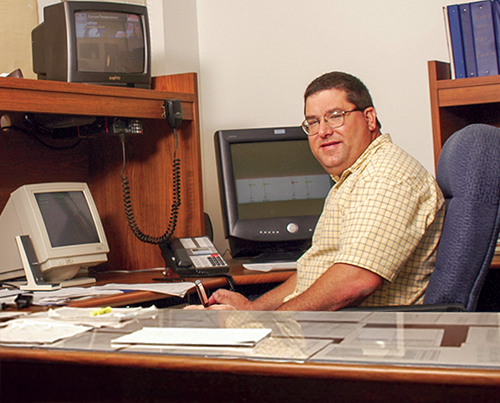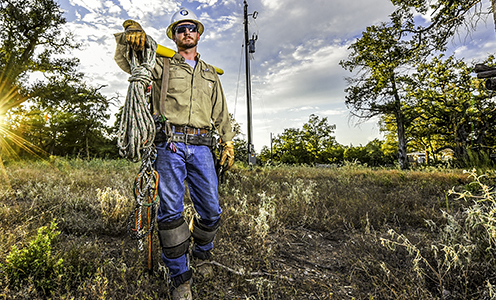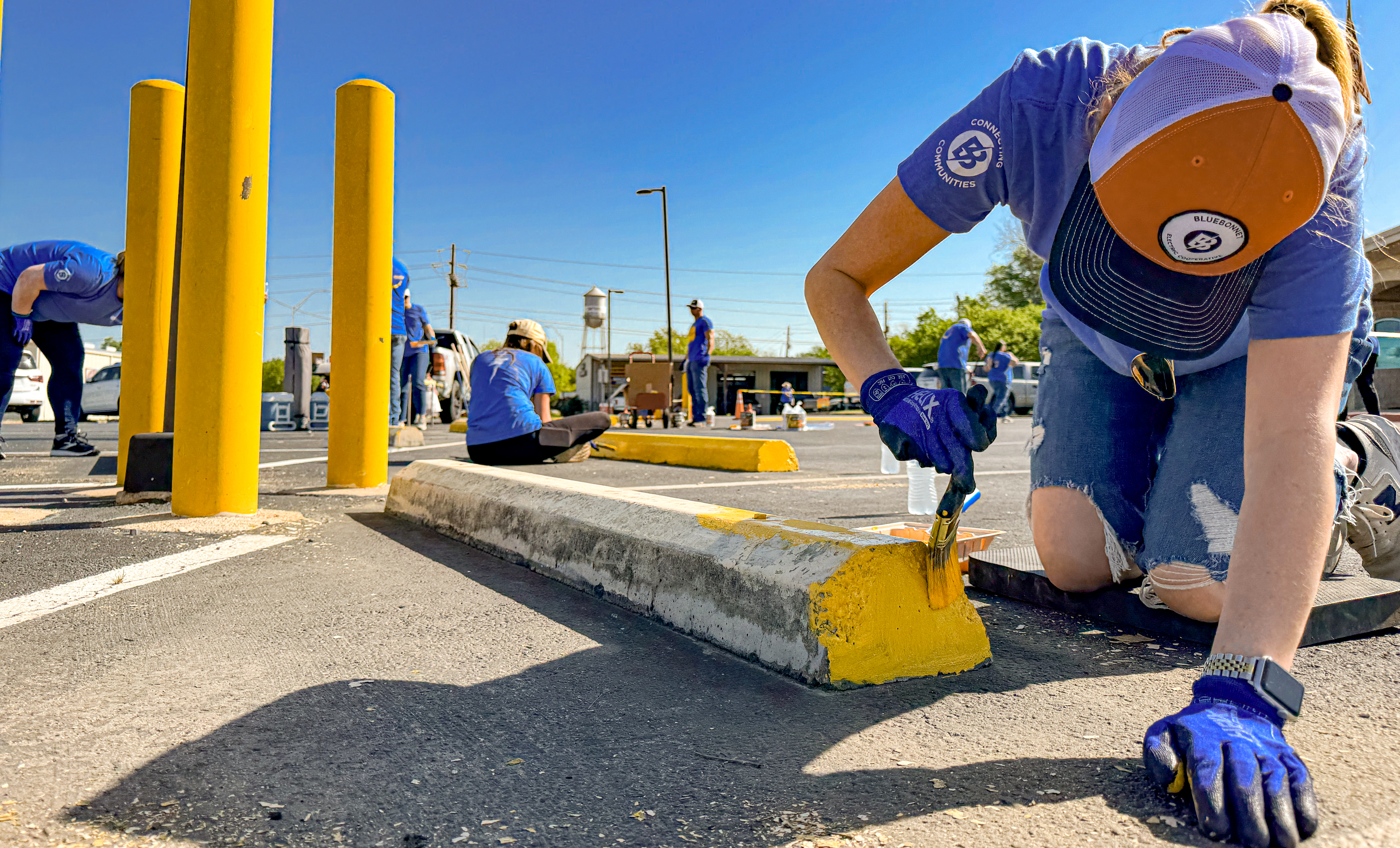The cooperative way
Recent news
Bluebonnet Electric Cooperative's five member service centers in Bastrop, Brenham, Giddings, Lockhart and Manor will shine blue at night throughout April to raise awareness of National Child Abuse Prevention Month and the region’s organizations that support families affected by abuse and neglect.
In the Bluebonnet area, six Court Appointed Special Advocates (CASA) programs cover all 14 counties where the cooperative provides electricity.
Other organizations in the Bluebonnet region that support cooperative members and their families include the Children’s Advocacy Center, which serves Bastrop, Lee and Fayette counties and offers care, support and services to children who have been abused or neglected; and SAFE Alliance, a nonprofit which operates in eastern Travis County and supports children, adults and families who have been affected by abuse or neglect. These local organizations welcome adult volunteers and donations.
If you suspect a child is being abused or neglected, call the Texas Abuse Hotline at 800-252-5400, or submit a report online at txabusehotline.org. In case of immediate danger to a child, call 911 to contact local law enforcement.
About the region’s abuse assistance agencies
Court Appointed Special Advocates (CASA)
Court Appointed Special Advocates (CASA) of Bastrop, Lee and Fayette counties supports children by providing specially trained community volunteers appointed by juvenile and family court judges to represent the interests of children who enter state custody after being removed from their families by Child Protective Services.
507 Water St., Bastrop
Open 8:30 a.m. to 5 p.m. Monday through Friday
512-303-2272
On the web: casabfl.org
Email kristi.bauer@casabfl.org
Children’s Advocacy Center
Children’s Advocacy Center, serving Bastrop, Lee and Fayette counties, provides a safe, child-friendly environment where law enforcement, child protective services, court prosecution, and medical and mental health professionals can share information and develop strategies to meet the needs of each case and child.
59 TX 150 Loop, Bastrop
Open 8:30 a.m. to 5 p.m. Monday through Friday
512-321-6161
On the web: childrensadvocacycenter.org
Email info@CACBastrop.org
CASA for Kids of South Central Texas
CASA for Kids of South Central Texas, serving Austin, Colorado, Waller and Washington counties, supports children by providing specially trained community volunteers appointed by juvenile and family court judges to represent the interests of children who enter state custody after being removed from their families by Child Protective Services.
1500 S. Day St., Brenham
Open 9 a.m. to 4 p.m. Monday through Friday
979-277-0088
On the web: wespeak4kids.org
Email info@wespeak4kids.org
CASA of Central Texas, Inc.
CASA of Central Texas, Inc., serving Caldwell, Comal, Guadalupe and Hays counties, supports children by providing specially trained community volunteers appointed by juvenile and family court judges to represent the interests of children who enter state custody after being removed from their families by Child Protective Services.
2725 Hunter Road, San Marcos
Open 9 a.m. to 5 p.m. Monday through Friday
Phone: 830-626-2272
On the web: casacentex.org
Email info@casacentex.org
The SAFE Alliance
The SAFE Alliance provides housing, support services and prevention programs to stop the cycle of violence in Central Texas
Children’s Shelter
P.O. Box 19454
Austin, TX 78760
Administrative office open 9 a.m. to 5 p.m. Monday through Friday
Phone: 512-369-5900
Reach the 24/7 SAFEline at 512-267-SAFE (7233), text “SAFE” to 737-888-7233 or chat online at safeaustin.org
On the web: safeaustin.org
All day, every day, skilled operators watch Bluebonnet’s electric system to locate outages, coordinate crews and keep the lights on.
By Alyssa Meinke
When a storm rolls in, a vehicle hits a power pole or an animal touches the wrong piece of equipment, Bluebonnet Electric Cooperative’s control center is the first to respond. A team of 10 control center operators work in shifts to monitor Bluebonnet's electric grid. When an outage occurs, the operators dispatch lineworkers to restore power as quickly and safely as possible.
POWER ON: Stories of outages, response and restoration — and communication every step of the way
These operators are the unseen first responders of Bluebonnet’s electric grid that keep power flowing to more than 138,000 homes, businesses and critical facilities. They are the vanguard of a team that works to keep members’ lights on 99.93% of the time, on average.
The process is complex and constant, requiring continuous reprioritization. “It’s like running a busy restaurant kitchen during a dinner rush — serving multiple dishes at once while new orders keep coming in,” said Bryn Janca, a control center operator at Bluebonnet for five years.
In addition to tracking and prioritizing outages — whether they impact a single member or thousands — and dispatching Bluebonnet and contractor crews to restore power, the operators use advanced technology to monitor and troubleshoot the entire electric system. They coordinate planned work requests and track the location and status of crews. They keep a close watch on weather conditions. They communicate regularly with member services and other departments to provide status reports to members.

The process has come a long way since Greg Roeber, Bluebonnet’s control center manager, started dispatching crews in 1995. Back then, the control center had one computer. “We used the computer to print outage reports and stacked them on a desk, prioritizing them by height — based on the number of pages,” Roeber said.
Now, operators use advanced software to detect outages, pinpoint issues on power lines and, when possible, reroute power to minimize disruptions. “We’re a support system,” he said. Roeber began working at Bluebonnet in 1982 as a lineworker before transitioning to the control center in 1995. He became its superintendent in 2005, then manager of the control center in 2017. After more than 40 years of service, he plans to retire in July.
“One of the things I’m most proud of is seeing how our team has grown,” Roeber said. “Training a new employee that doesn’t have a lot of electrical experience and watching him connect the dots as he becomes a knowledgeable and thoughtful operator is one of the most fulfilling aspects of the job.”
The operators come from various educational and military backgrounds, contributing diverse strengths to the team.
“The best trait of an operator is being self-motivated and having the ability to learn,” Roeber said. When there is downtime, the team runs drills to ensure they are prepared for any situation.
“We want everyone to learn,” Roeber explained. “We take a look at what we can improve and how we can operate differently to get better.”
Despite all the technological advancements, the heart of the control center is the people. Operators ensure lineworkers are safe in the field, relay information to update members on the status of their outage and respond to emergency calls.
Communication is key to a smooth response to outages. Operators constantly relay information to and from the field, with 350 to 400 messages by phone, radio and text coming in and going out on a typical day. “As soon as we get any relevant information, we relay it – whether it’s from the members, our guys in the field or other operators,” Janca said.
“It’s like community service,” said Max Baird, a control center operator with 11 years of experience. “Serving the community while supporting our families is rewarding.”
“We don’t like to see our members out of power for any reason,” Janca said. Baird agrees: “We’re a team. We’re here for our members.”
There is one piece of advice operators want to give to members: Keep your contact information updated. “It helps us find you in the event of an outage, dispatch crews and get your power back on faster,” Janca said. “Leave detailed and clear messages when you call to report an issue. We’re always listening,” Baird said.





